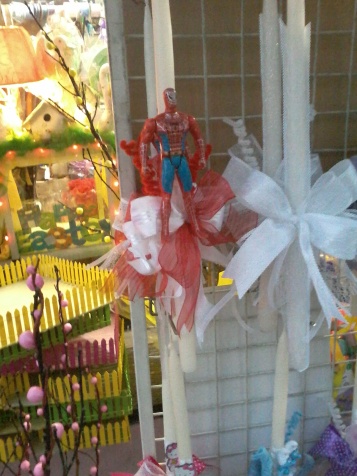
For the first time in the middle east, Rola Sleiman was ordained as a pastor of an Evangelical church in Tripoli, North of Lebanon. On the afternoon of this past Sunday 26 of February, in a direct break with the tradition of all Christian sects in the Middle East, Rola Sleiman became a fully-ordained woman pastor.
If you support women rights you will undoubtedly celebrate this step.
However, if you are a Bible-believing Christian, then you might have some misgivings.
Doesn’t Paul clearly teach in 1 Timothy 2:12 that he does not “permit a woman to teach or to have authority over a man; she must be silent”? How can a woman take a leadership role inside the church when the Bible says she can’t?
If you have the above reasoning, then allow me to present a different view point.
Here are 3 simple arguments from the Bible to why a woman could be a pastor:
The equality of men and women in the Bible
In Genesis 1 and 2, before the “fall” of Genesis 3, the picture we have is of a totally equal male and female. In Genesis 1:27, they are both, together, the image of God. There is no subordination. In Genesis 2:18 the woman is man’s helper. Now “helper” in Hebrew is mostly used of God as a helper to his people (e.g. Exodus 18:4; Deuteronomy 33:6; Psalm 33:20…etc.). You can’t argue that God is subordinate to his people, and similarly you can’t argue that the woman is subordinate to the man in Genesis 2.
Where do we get the idea that the man is the head of the woman? From Genesis 3 after the fall from God’s grace! God’s original plan, the one that Jesus aims to bring back to humanity, is of total equality between male and female.
Similarly, Paul declares that in Christ there is “neither Jew nor Greek, there is neither slave nor free, there is no male and female, for you are all one in Christ Jesus” (Galatians 3:28). When he does speak of submission (e.g. Eph. 5:24; 1 Cor. 11:3…etc.) it is usually in the context of a husband and wife. Note that this submission of wife to husband is the submission of love not subordination. He is called to serve her until death and she him in all circumstances. Later, both are called to submit to each other. In all cases, Paul is not speaking of general submission of females to males but to a specific cultural reading of marriage (husband and wife).
Interestingly, in Paul’s declaration of equality in Galatians 3:28 mentioned above, he uses the rare terms “male-female” (arsen-thely) rather than “husband-wife” (aner-gune). For Paul, the husband might be the head of the family, but in church, male and female are equal.
Hence, in the beginning story of humanity and in the salvation of Christ, men and women are on equal footing.
Women take various leadership roles in the Bible
Here are just a few of the many examples where women were serving in leadership roles in the Old Testament, and in leadership roles in the New Testament:
Deborah is a judge over all the people both male and female (Judges 4 and 5)
The prophetess Huldah (2 Kings 22:13-14)
The first witnesses of the resurrection of Jesus, and hence the first preachers, were women (Mark 16:1-8; Matthew 28:1-10; Luke 24:1-9; John 20:1-18)
Jesus treated women in a revolutionary manner in his own times (e.g. John 4:7-30; Mark 5:25-34; John 8:1-11…etc.)
Phoebe is a deacon (Romans 16:1)
Junia is a female pastor (Romans 16:7)
The church in Philippi had women leaders (Philippians 4:2-3)
Priscilla is mentioned with her husband Aquilla (indeed her name is placed before him) in teaching roles (Acts 18)
The New Testament as a stepping stone for further development
Could the church across the centuries build upon the New Testament principles and express them in innovative terms?
Of course! Not only we can, we HAVE to! Every time we step to the Bible and read it in our own context we are challenged to apply it. However, it was written 2000 years ago, how can we then apply it to the year 2017 in Beirut? We seek the biblical principles and apply them to our day.
Didn’t Jesus do that?
Didn’t he take the heart of the Torah (or roughly the Law of Moses) and apply it in new ways? The Torah orders that an eye be given for an eye. But Jesus goes to the heart of the Torah, the principle of redemptive justice, and declares that we should forgive our enemies. The Torah asks for purity cleansing before eating. But Jesus goes to the heart of the Torah, the principle of having a pure heart, and abolishes the food laws.
The principle of equality of all was argued for by Paul, as we saw in Galatians 3:28. However, the same Paul can write to the slaves asking them to “obey their earthly masters with fear and trembling” (Ephesians 6:5). Now, if the church encounters a modern-day slave, would she ask him to obey his master in fear and trembling? Does the church still support slavery? Absolutely not. But hear this, for big parts of our history the church did support slavery. But the principle of equality, ingrained in the gospel, finally shone through, and through Christians who fought for the abolition of slavery, slavery was finally abolished and is seen as a disgusting practice by most society.
Could we then, with a clear conscience, ordain a woman as a pastor in the church? I can say with full confidence: yes!
I would even go further and say that the very Bible used by many to ban women from ordination is the same book that pushes me to call for the full inclusion of women in the ministry of the church!
Pastor Rola Sleiman, I offer you my sincere congratulations. May you serve the Lord for many years with courage and love.
To women of the Nazarene Church, a church whose constitution allows for the ordination of women, I call those who feel God’s calling to step up and be the pioneers in our church in the Middle East.
To all Christians of the middle east, let us shine our light, the light of God’s equal creation of male and female, through the leadership of more women in our churches.
Let us stand in prayer
Lord,
Move your church
That we may truly be
Your body
Female and Male
Amen
مدونة حيث تجتمع الجوارح
مدونة #60: هل تستطيع الامراة ان تكون قسيسة؟

لاول مرة في الشرق الأوسط، تمة رسامة الواعظة رلى سليمان كقسيسة في الكنيسة الانجيلية المشيخية في طرابلس، شمال لبنان. بعد ظهر الاحد الماضي في 26 شباط، وفي كسر لتقليد جميع الطوائف المسيحية في الشرق الاوسط، أصبحت رولا سليمان قسيسة كاملة الصلاحيات
اذا كنت تؤيد حقوق المرأة فبالتأكيد ستفرح بهذه الخطوة
ولكن ان كنت مسيحي يؤمن بالكتاب المقدس، فقد تكون لديك بعض التساؤلات
ألا يعلم بولس بوضوح في 1 تيموثاوس 2: 12 بأنه لا يأذن “للمرأة أن تعلم ولا تتسلط على الرجل، بل تكون في سكوت”؟ كيف تستطيع المرأة أن تاخذ دور ريادي في الكنيسة بينما الكتاب المقدس يقول عكس ذلك؟
اذا كان لديك هذا التفكير فاسمح لي أن اقدم لك وجهة نظر مختلفة
ها هي 3 حجج بسيطة من الكتاب المقدس تبرهن انه بامكان المراة ان تصبح قسيسة
المساواة بين الرجل والمراة في الكتاب المقدس
في تكوين 1 و2، قبل “السقوط” في تكوين 3، الصورة التي نمتلكها هي للمساواة المطلقة بين الرجل والمراة. في تكوين 1: 27، الاثنان معا يشكلان صورة الله. لا يوجد تراتبية. في تكوين 2: 18، المرأة هي “مساعد” للرجل. كلمة “مساعد” في العبرية عادة ما تستخدم عن الله كمساعد لشعبه (مثلا خروج 18: 4؛ تثنية 33: 6؛ مزمور 33: 20…الخ.). لا تستطيع ان تقول ان الله يخضع لشعبه وكذلك لا تستطيع ان تستنتج من تكوين 2 أن المراة تخضع للرجل
من أين أتت فكرة ان الرجل هو رأس المرأة؟ من تكوين 3 بعد السقوط من نعمة الله! خطة الله الأصلية، تلك التي هدف يسوع لارجاعها للبشرية، كانت تتضمن مساواة مطلقة بين الرجل والمراة
بشكل شبيه، يعلن بولس أنه في المسيح “ليس يهودي ولا يوناني. ليس عبد ولا حر. ليس ذكر وانثى، لانكم جميعا واحد في المسيح يسوع” (غلاطية 3: 28). عندما يتحدث بولس عن الخضوع (مثلا أفسس 5: 24؛ 1 كورنثوس 11: 3…الخ.) فهو عادة ما يتكلم في سياق زوج وزوجة. لاحظ أن خضوع الزوجة لزوجها هو خضوع المحبة وليس التراتبية. هو مطلوب منه خدمتها حتى الموت وهي خدمته في كل الظروف. لاحقا في نفس المقطع، يطلب بولس من الاثنين الخضوع لبعضهما البعض. في كل الأحوال، بولس لا يتكلم عن خضوع الأنثى بشكل عام للذكر، بل يتكلم عن قراءة ثقافية محددة للزواج
ما يثير الاهتمام هو انه في اعلان المساواة في غلاطية 3: 28 أعلاه، يستخدم بولس عبارتي “ذكر-انثى” (ارسين-ثيلي) النادرتين وليس عبارتي “زوج-زوجة” (انير-جوني). بالنسبة لبولس، كونن الرجل رأس العائلة لا يعني أنه في الكنيسة الذكر والأنثى ليسا متساويين
اذا، في قصة بدايات البشرية وفي خلاص المسيح، النساء والرجال متساوين
النساء تأخذ عدة مواقع قيادية في الكتاب المقدس
هذه بعض الأمثلة لنساء خدمت في مواقع قيادية في العهد القديم والعهد الجديد
دبورة كانت قاضية لكل الشعب نساء ورجال في قضاة 4 و5
خلدة النبية في 2 ملوك 22: 13-14
أول من شهد على قيامة المسيح كانت نساء ولذا هن كانوا أول واعظين مسيحيين في مرقس 16: 1-8، متى 28: 1-10، لوقا 24: 1-9، ويوحنا 20: 1-18
يسوع عامل النساء بطريقة ثورية بالنسبة لعصره مثلا في يوحنا 4: 7-30، مرقس 5: 25-34 ويوحنا 8: 1-11
فيبي كانت “خادمة كنيسة” في رومية 16: 1
يونيا كانت قسيسة أنثى في رومية 16: 7
كنيسة فيلبي كانت تقودها نساء في فيلبي 4: 2-3
وبريسكيلا تذكر مع زوجها أكيلا (وحتى اسمها قبل اسمه) في أدوار تعليمية في أعمال الرسل 18
العهد الجديد هو نقطة انطلاق لتطورات لاحقة
هل تستطيع الكنيسة عبر العصور أن تبني على مبادئ العهد الجديد وتعبر عنها بطرق خلاقة؟
بالطبع! ليس فقط نستطيع بل نحن مضطرون لفعل ذلك! كل مرة نتقدم فيها من الكتاب المقدس ونقراه في سياقنا لدينا تحدي تطبيقي. نجد أنفسنا نقرا كلام مكتوب قبل 2000 سنة، فكيف نستطيع تطبيقه سنة 2017 في بيروت؟ نفتش عن المبادئ الكتابية ونطبقها في يومنا الحالي
ألم يفعل يسوع ذلك؟
ألم يأخذ قلب التوراة (أي تقريبا ناموس موسى) وطبقه بطرق جديدة؟ التوراة تأمر بأخذ العين مكان العين. ولكن يسوع ذهب الى قلب التوراة، ومبدأ العدالة الفادية، وأعلن أنه علينا أن نسامح أعداءنا. التوراة تطلب الغسل الطقسي قبل الأكل. ولكن يسوع ذهب الى قلب التوراة، مبدأ القلب النقي، وألغى قوانين طهارة الطعام
مبدأ مساواة الجميع يعلنه بولس، كما رأينا في غلاطية 3: 28. ولكن نفس هذا البولس يستطيع أن يطلب من العبيد أن “يطيعوا أسيادهم بخوف ورعدة” (أفسس 6: 5). الأن، ان قابلت الكنيسة اليوم عبودية معاصرة، هل تطلب من المستعبدين أن يطيعوا أسيادهم بخوف ورعدة؟ هل ما تزال الكنيسة تؤيد العبودية؟ بالطبع لا. ولكن اسمعوا هذا، لمدة طويلة من تاريخها دعمت الكنيسة العبودية. ولكن مبدأ المساواة المزروع في الانجيل أشرق أخيرا، ومن خلال مسيحيين حاربوا لالغاء العبودية، تم الغاء العبودية وأصبحت نشاطا مكروها في معظم المجتمع
هل نستطيع، بضمير صالح، أن نرسم امرأة كقسيسة كنيسة؟ أقول بكل ثقة: نعم
وأذهب أبعد من ذلك وأقول أن نفس الكتاب المقدس الذي يستخدمه كثير من الناس ليمنعوا المراة من الرسامة يدفعني أنا لأدعو لقبول المراة الكامل في خدمة الكنيسة
حضرة القسيسة رولا سليمان، أقدم لك أحر التهاني. اتمنى لك سنين كثيرة في خدمة الرب بشجاعة ومحبة
الى كل نساء كنيسة الناصري، هذه الكنيسة التي يحتوي دستورها على قبول لرسامة النساء، أحث كل من تشعر بدعوة الله أن تتقدم للقسوسية وتصبح رائدة في كنيستنا في الشرق الأوسط
والى كل مسيحيي الشرق الأوسط أقول، ليضئ نورنا، نور خليقة الله المتساوية للذكر والأنثى، من خلال دور أكبر للمرأة في قيادة الكنيسة
دعونا نقف لنصلي
يا رب
حرك كنيستك
لكي نكون حقا
جسدك
أنثى وذكر
آمين










